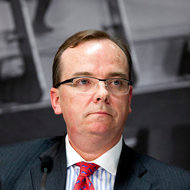That disconnect could explain why Democrats and Mr. Obama are still struggling to translate public support into tangible political backing for their initiatives. Americans did not give Mr. Obama high marks for his handling of those issues — even though more than two-thirds of Americans over all, including a majority of Republicans, disapprove of the way Republicans in Congress are handling their job.
“I’m for stricter gun laws, but the reason I favor the Republicans over the Democrats and the liberals on gun laws is because they have always been against the Second Amendment and the right to own guns,” said Jim Hensley, 69, a Republican from Grandville, Mich., in an interview after the poll was conducted.
“Yes, I believe the Republicans should have voted for background checks, and they should not legalize automatic weapons,” Mr. Hensley added. “I was against the repeal of the ban on automatic weapons, and I don’t support the N.R.A. But it’s like marriage. You stick with your wife no matter what, and you don’t just ditch your political party on one issue.”
Two weeks after a bipartisan measure that would have expanded background checks for gun buyers was defeated in the Senate, nearly 9 in 10 of those surveyed said they favored background checks on all gun buyers, and 6 in 10 said they were disappointed or angry with the vote.
On immigration, 83 percent of respondents said they supported a path to citizenship for the 11 million immigrants already in the country illegally, as long as certain requirements — like paying fines and back taxes, passing a criminal-background check and learning English — were met. And nearly 6 in 10 favored a combination of cutting spending and raising taxes to reduce the federal deficit, echoing the plans being pushed by Mr. Obama and Congressional Democrats.
Yet Americans are closely divided on whether Republicans would handle these issues better than Mr. Obama, the poll showed.
Both stricter gun laws and an immigration overhaul received strong support from Republicans, with 86 percent favoring background checks on all potential gun buyers, and 83 percent favoring a path to citizenship if certain requirements were met. Last month, a bipartisan group of eight senators proposed such immigration legislation, which would offer a 13-year path to citizenship, as well as require certain border security measures.
Only 41 percent of those surveyed approved of Mr. Obama’s handling of gun policy, and 52 percent disapproved. Americans were about evenly divided on whom to trust to make decisions about gun laws and an immigration overhaul — Republicans in Congress or the president.
Rick Buckman, 52, a Republican and an electrical engineer from Dallas, Pa., said that while he supported stricter gun legislation, he did not necessarily approve of the president’s approach. “I was really ticked off that the law didn’t pass,” Mr. Buckman said. “But I thought it was wrong of President Obama to get in front of the public and use people who had been damaged by gun violence as props.”
Mike Brady, 68, a Democrat and semiretired lawyer in Farmington Hills, Mich., viewed the Republicans’ opposition to the gun control legislation as self-serving. “Well, Obama’s trying his best to do the obvious right thing for the country, but he’s been roadblocked extensively for political reasons by people who even among themselves would take a different position,” he said. “So it’s cynical, unprincipled obstructionism.”
The poll also showed that 57 percent disapproved of Mr. Obama’s handling of the federal budget deficit. Thirty-six percent of respondents supported reducing the deficit by cutting federal spending.
Though churning support for his agenda remains a problem for the president, according to the poll, Congress is struggling with overcoming its own unfavorable image. Three-quarters of Americans disapprove of the way Congress is handling its job, the poll found, and nearly 9 in 10 said most members of Congress were more concerned with serving special interest groups than helping the people they represent.
“It’s like the gladiator sports, where the emperor keeps the people entertained, even though we’re starving,” said Roberta Hughes, 61, of Elizabeth City, N.C. “But real people are losing out in real ways when they enact the drama.”
The nationwide poll of 965 adults was conducted from April 24 to April 28 on land lines and cellular phones, with a margin of sampling error of plus or minus three percentage points.
Nearly 6 in 10 Americans said they would vote for a candidate who did not share their views of immigration. Only 4 in 10 said they would vote for a candidate who did not share their views on gun control — seemingly making immigration a less controversial issue at the voting booth, for now, than gun legislation.
“Stricter gun laws might help with some of the out of control people who randomly go around shooting others or killing themselves,” said Debby Warnock, 44, an independent from Pueblo West, Colo. “I do favor background checks, though some of the people who have killed others had clean backgrounds.”
She added: “I personally don’t care whether Republicans or Democrats make the decisions as long as it’s in the best interest of our country.”
Megan Thee-Brenan, Dalia Sussman and Marina Stefan contributed reporting.
Article source: http://www.nytimes.com/2013/05/02/us/politics/poll-finds-strong-support-for-tightened-gun-laws-and-path-to-citizenship.html?partner=rss&emc=rss
